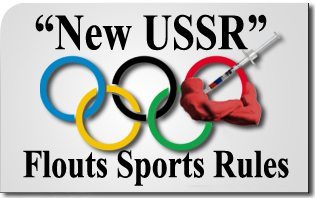 “All of us, Russian athletes, dope ourselves at some point. Our leaders impose it on our trainers, and these on the sportsmen. You wind up by thinking you’re doing nothing wrong,” Yuliya Rusanova explained.
“All of us, Russian athletes, dope ourselves at some point. Our leaders impose it on our trainers, and these on the sportsmen. You wind up by thinking you’re doing nothing wrong,” Yuliya Rusanova explained.
She won a bronze medal at the 2011 Paris Indoor 800 but was punished in 2013 for changes in her “biological passport.”
“There is a whole methodology to prevent ‘positive’ doping results from coming up. Officers make sure that athletes are not subjected to tests,” added her husband, Vitaly Stepanov, a former head of Russia’s Anti-doping Agency (Rusada), the Spanish daily El Mundo reported.
“Sportsmen are under a whole lot of pressure and ultimately have no alternative to illegal practices,” added Oleg Popov, a coach of several athletes “banned” over the last few years.
“Some may be ‘clean’, but 99% of even the best athletes in the Olympics end up by caving in,” admits his trainee, discus thrower Evgenia Pecherina. In 2013 she was ‘caught’ twice for using a powerful anabolic steroid and was banned for ten years.
Before eye witnesses and hidden cameras, Mariya Savinova, Olympic champion and World Indoor 800 champion admitted using performance-enhancing drugs. The scene was shown in a documentary aired by the ARD German television network titled “The Secrets of Doping: How Russia Makes Its Winners.”
The documentary’s key point is that Russian athletes keep their world status through a criminal system with government support.
According to the documentary, Valentin Balajnichev, President of the Russian Sports Federation (ARAF) and Treasurer of the IAAF Athletics World Federation takes charge of making illegal programs to circumvent the latest drug tests. And Gregori Roshenkov, director of Moscow’s anti-doping laboratory, applies the tricks.
Serguei Portugalov, an ARAF doctor linked to IAAF in the anti-doping struggle, actually charges a cut from the sportsmen’s prizes: 50,000 rubles ($850 or €760 at the time) for each gold medal in an international competition, 30,000 rubles ($510/€456) for a silver medal, and 20,000 ($340/€304) for a bronze one. “I had to pay for the medal I won,” Yuliya Rusanova adds.
In February 2013, WDR, another German TV network, disclosed that Russia was systematically employing Xenon gas to boost blood values.
For its part, the French sports paper L’Equipe denounced a corruption scheme whereby Russian athletes who got ‘caught’ could buy their way out of trouble without much heartache.
The paper mentioned how Liliya Shobukhova — the second fastest marathon runner in history after Paula Radcliffe — escaped a sanction before the 2012 Olympic Games in London by paying $503,398 (€450,000).
“I gave the money and they said, ‘all is fine,’” the runner explained. She also denounced trainer Alexei Melnikov and the above-cited Balajnichev.
Liliya was unable to participate in the Olympics because of a lesion and asked for a one-year sabbatical to have a child. Given the circumstances, ARAF asked her to admit to doping, returned $335, 573 (€300,000) and banned her from competition for two years.
Beyond personal cases, what you find is an unscrupulous design to launch the “new USSR” as a world power at all levels — Vladimir Putin’s wild dream — by employing all kinds of tricks, even the most immoral.

